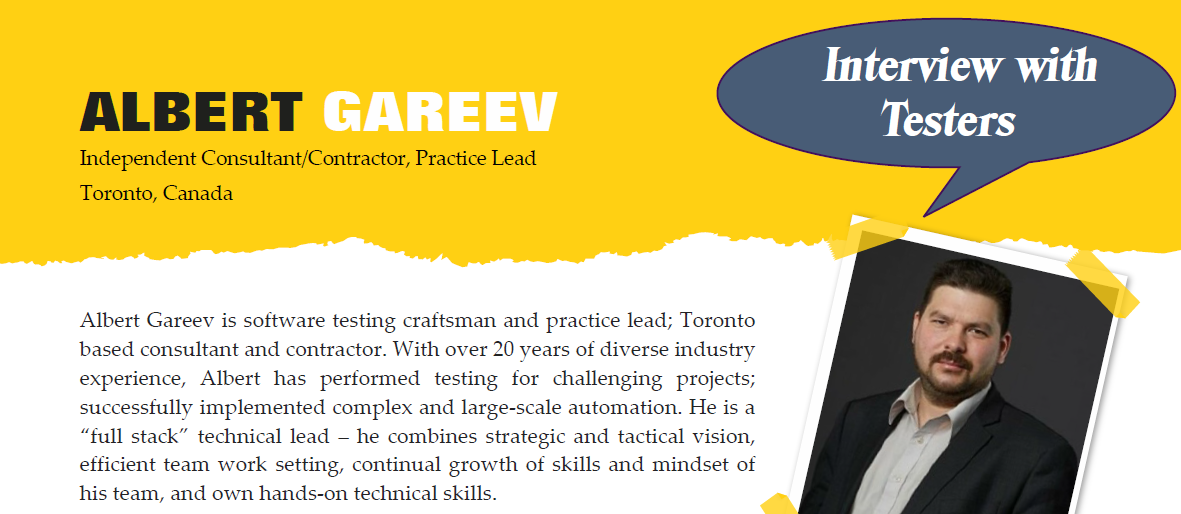Interviewed by Srinivas Kadiyala

In September Srinivas Kadiyala interviewed me for Testing Circus – a professional software testing magazine with a breezy name :)
I’m thankful for this opportunity and humbled to get in the same line with testing leaders around the world.
- Access online: Volume 6 – Edition 9 – September 2015.
- Download here.
The interview is pretty long.. In my blog I’d like to feature 2 questions.
In current trends, there are topics like “Traditional testing is dead”. Do you think testers should have automation testing knowledge?
“Traditional testing”? What is that? I suppose, as “traditional testing” you meant an approach when manual test scripts are created by one person ahead of time and executed by others upon arrival of the software a few weeks or months after. With test case numbers, created and executed, as main performance metrics. There are variations, of course, and yet it’s a quite typical testing model referred as a “factory” approach or school of testing. This kind of testing approach encourages selection of cheap (and poorly skilled) resources – but is still very attractive for a number of reasons. Many outsourcing companies live off the Factory model and remain quite alive.
However, there are products and industries demanding rapid feedback and a highly effective testing, i.e. – finding problems that matter. To remain relevant, testing model has to adapt or “die” – rather, be absorbed into responsibilities of various IT roles. Note that titles are superficial. I’ve seen many teams and projects claiming that they do great products without QA – but a lot of thorough testing activities were carried on by their team members. I do think though that having within a professional who is specialized in critical thinking and questioning helps the teams move faster with lower risks.
Generally, knowing how code is written and works may help to be a better tester in some circumstances. But I certainly don’t think that automation by itself will be a savior for testers with Factory school mindset. Being a long time automation engineer and test lead I have examples of great testers quickly learning automation tools, and examples of automation scripters seriously struggling to offer a real value for the testing team. Another warning I always give to the teams I work with: be conscious about your time allocation – time you spend coding is the time lost for testing. It might be worth as a personal fun but not necessarily a good investment project wise.
Having said that, for specialized testing – load/performance, security, integration, and other – creation and use of tools extends testers’ capabilities beyond “naked eye and hand” and makes it only possible.
Do you read testing books? If you were to name five books that every tester should read which ones those would be and why?
I read testing books and books that can inspire better testing.
As a number one I recommend Perfect Software and Other Illusions about Testing
by Gerald Weinberg. This is a technical philosophical book about testing, quality, IT processes, and people. Not just a bag of tricks and techniques but insightful answers to why do we need (to bother) to test, what’s the nature of software development process, and how people play in it based on their roles.
The second book is also Gerald Weinberg’s Becoming a Technical Leader. Testing is a profession that demands a lifelong learning. This book is an excellent guide.
Although this argued by some, testing is one of the most “social” professions amongst other in IT. We need to find problems important to people, influence people, negotiate, and deliver difficult messages – and do that professionally and effectively. What could be the best recommendation here than Dale Carnegie’s How to Win Friends and Influence People
?
Testing Computer Software
by Cem Kaner is an old but still solid book that can give a great exposure. I recommend reading it along with later added online references and comments by the author.
On par with books I recommend Internet resources. Testers should read blogs, testing magazines (like yours!), think, debate, and participate in discussions.


